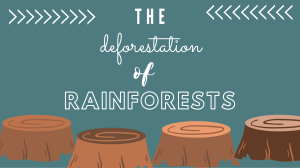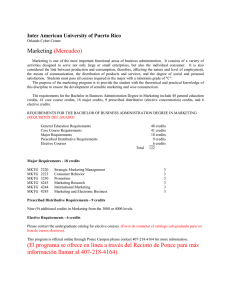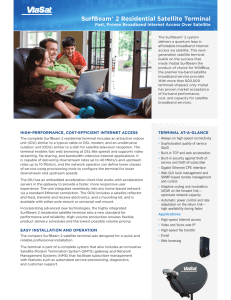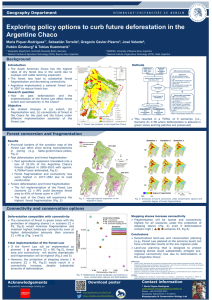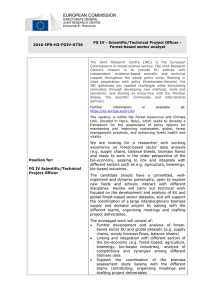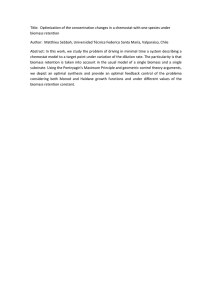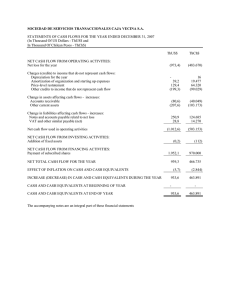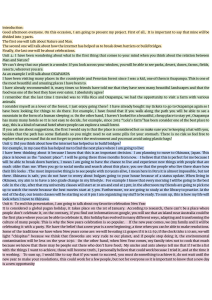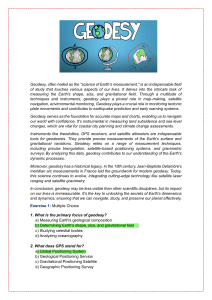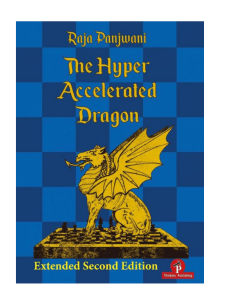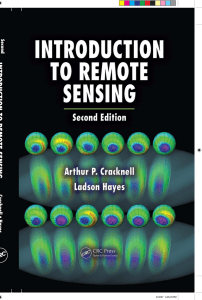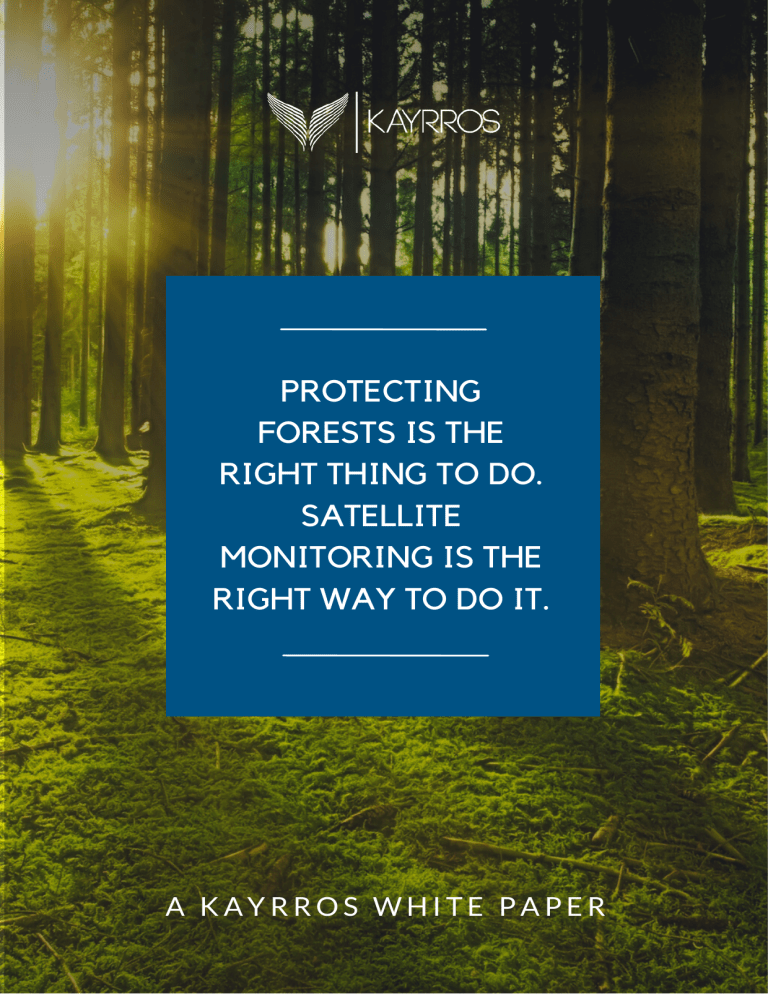
PROTECTING FORESTS IS THE RIGHT THING TO DO. SATELLITE MONITORING IS THE RIGHT WAY TO DO IT. A KAYRROS WHITE PAPER CONTENT NBS are key to mitigate climate change What we are doing wrong today ? Track NBS the right way with satellite imagery analytics Going beyond deforestation Proof by the example - A REDD+ project goes from 1 million credits to zero Who are we? 2 KAYRROS However, Nature Based Solutions have not NBS ARE KEY TO MITIGATE CLIMATE CHANGE yet reached their full potential. Indeed, current techniques make it challenging to Nature Based Solutions, or NBS, are carbon projects based on the restoration or the track the amount of carbon sequestered, or avoided, today. preservation of ecosystems. In the context of an exponentially growing carbon market, the development of Nature Based Solutions has been accelerating strongly with the demand for carbon credits on track to exceed US$1 billion in 2022. The IPCC (International Panel on Climate Change) concluded in its latest report that NBS are crucial to meet the 1.5 deg C target that was firstly defined in the Paris Agreement. WHAT WE ARE DOING WRONG TODAY ? The methods that have been implemented until now to monitor the development of Nature Based Solutions to validate the carbon credits issued are not efficient enough. NBS projects to protect forests are usually monitored through an analysis based on several Short-term necessary carbon to sequestration mitigate and is drastically decrease GHG emissions. NBS are the most convenient and easily scalable methods to meet this objective. It has been estimated that about one third of climate change mitigation needed to meet the goals of the Paris Agreement can be provided Nature-Based Solutions (Source IUCN). by samples of a forest that is considered to be representative of the whole area. This is often a large assumption. According to Marvin (2014), aboveground biomass estimates are accurate with an impractical number of 1-ha field plots. Such an evaluation is usually done every five years, and carbon credits are therefore issued over long periods of time without any intermediate assessment. Deforestation or degradation can remain undetected, and 3 KAYRROS too many carbon credits might be issued. These methods are not powerful enough to With satellite imagery, the whole area of a assess the permanence (GHG emissions NBS project can be monitored to keep track need to be durably compensated) and the of the evolution of the area over weekly or additionality (credits are generated when a monthly periods. This enables a more project brings more value than inaction) of a reliable validation of the issued carbon NBS project credit, and provides the opportunity to react quickly and accordingly when a disruption Tracking NBS projects through regular and frequent monitoring will enhance is detected. the reliability of the carbon market, with a Satellite monitoring is particularly helpful in precise a number of ways.. estimation of the carbon sequestration. Enhancing the transparency of NBS projects will also increase the Due diligence confidence of the players in the carbon Currently, satellite imagery is sometimes market, and increase the value of a carbon used to estimate the biomass baseline and credit. to demonstrate the additionality of a project, but is not used to its full potential. TRACK NBS THE RIGHT WAY WITH SATELLITE IMAGERY ANALYTICS Historical land use analysis is necessary over the area of interest, with at least ten years of depth. With algorithmic treatment of satellite Satellite monitoring of forests can overcome imagery, however, the necessary analysis these can be done quickly with standardized issues, tracking, with based not reliable only observations, but also technologies to detect and on on timely individual methodology and criteria. leading-edge and deforestation and degradation. quantify Risk Management Current methods used to estimate risks and define the carbon credit buffer pool of a project 4 KAYRROS are qualitative imprecise estimates accurate data. and based on rather than on Using satellite imagery, it is possible to access historical analysis, and data and spot risks to quantitative that were GOING BEYOND DEFORESTATION previously undetected. Degradation Satellite imagery also enables geographical Current monitoring methods are mainly analysis of the risks that are not necessarily focused equally distributed on each zone of a NBS deforestation. Until recently, the degradation project. of the forest has been difficult to assess,but satellite Mitigation strategies can therefore become on spotting imagery now and avoiding provides a real advantage in this field. much more efficient, with a focus on risky areas or even with a reshaping of the project. Forest degradation can be defined as the decline in tree cover or in the biodiversity in an area of a forest due to natural causes or human activity. This differs from deforestation, which is characterized by the total destruction of the forest in a defined area. Monitoring and verification Satellite imagery enables Forest large-scale automated monitoring of biomass including losses, plantation dates, survival is therefore more challenging to detect. Radar imagery detects smaller scale changes such as: rates, growth rates and more. Indeed, satellite Selective logging, which usually goes measurements of biomass are extremely under the radar, but can represent an accurate and can cover vast areas making equivalent loss of biomass than one the monitoring of a project both continuous provoked and transparent. deforestation These benefits are considerable by large patches of when Opening of new paths in the forest, which compared with a typical NBS project today can be a strong signal for further larger that is only checked every three to five years deforestation in the future and does not easily enable the free and rapid circulation of information between the various stakeholders involved in a NBS Project. 5 degradation KAYRROS Risks disaster represented "at least For natural risks, historical data 95% of the roughly 6 million analysis can be necessary to tons of carbon offsets set aside define the buffer pool, i.e. the to insure all forest projects share of the carbon credits that against the risk of fire over a will cover for the potential century-long period" (Financial losses and damages, with a Times). regular evaluation update to on risk consider the effects of climate change. The example of wildfires is particularly relevant to highlight the power of satellite During the summer of 2022, imagery. California combined with machine wildfires that burnt six forest learning and artificial projects to ashes. intelligence enables a clear suffered severe mapping CarbonPlan estimated that this Earth of observation high-risk areas where wildfires are the most likely to ignite. Figure 1 - Example of detection of burnt areas 6 KAYRROS An example here with a wildfire that occurred in 2020. Kayrros runs a damage analysis to assess the impact of a fire which occurred in the project area defined by the white outlines. The burnt areas are clearly visible by comparing the images from February and April. With climate change increasing the occurrences of wildfires, satellite monitoring is now essential to thoroughly evaluate the risks. Figure 2 - Detected fires by type of vegetation and by month of occurrence (2000 - 2022) 7 KAYRROS PROOF BY THE EXAMPLE A REDD+ PROJECT GOES FROM 1 MILLION CREDITS TO ZERO This project had been generating carbon credits for years, accounting for the REDD+ projects (Reducing Emissions from emissions Deforestation and forest degradation in compensated. Developing countries) can turn into a spotted in the leakage belt, which caused disaster when improperly monitored. the that were But interruption of supposedly deforestation the carbon was credits emissions. Let's take the example of a project in Brazil. However, due to an unreliable methodology Covering a large area of 72,000 hectares, the of monitoring, an important amount of project was located in an isolated area, carbon credits have been issued between the subject to security threats including illegal actual deforestation (which started in 2017) deforestation and drug trafficking. The and the moment it was detected (the credits guards allocated to the surveillance of the stopped being emitted in 2020). This created project were not enough to monitor the a vast project area. emitted and the actual emissions avoided. significant Figure 3 - Carbon credits issued 8 KAYRROS gap between the credits Figure 4 - Observed loss of ABG Carbon Using satellite imagery would have been beneficial to: Spotting the deforestation in the leakage belt immediately Identifying the degradation of the forest with radar imagery 9 KAYRROS WHO ARE WE? Kayrros, a leader in geo-analysis, has created Our Geographic Information System (GIS) the Forest Carbon Monitor: a comprehensive platform supports both conservation and tool fusing artificial intelligence algorithms afforestation with satellite imagery to provide key metrics Measurement, on forests for the voluntary carbon markets, (MRV), including for very large or remote areas. projects with Reporting and near-realtime Verification from project design to monitoring and Kayrros analyzes risks, measures biomass, verification. detects damage on plantations, bringing peace of mind for all stakeholders in the voluntary carbon market. 10 KAYRROS FREE DEMO If you would like a free demo of our solutions, please click here to book an appointment with a Kayrros expert. Telling you what Kayrros can do for your is great, showing you the benefits the personalized way is even better! CONTACT US WWW.KAYRROS.COM Act of 1940, as amended, and is not a DISCLAIMER commodity trading adviser within the meaning of Section 1(a)(12) of the U.S. This report is provided by Kayrros SAS (“Kayrros”) pursuant to the following terms and conditions: Commodity Exchange Act. Kayrros does not provide investment advisory, portfolio management industry data and financial planning services. The analyses, forecasts, metrics, samples, Energy or reports estimated figures, trends, figures, tables, graphs, projections and published by Kayrros (“Kayrros Reports”) other and made available to paid subscribers contained in Kayrros Reports do not and/or represent other recipients (collectively forms of data or that may contain be any “Recipients”) are creative works of the recommendations to buy or sell any mind algorithmic security or any financial products and analysis of publicly available data and the should not be relied upon as the basis for information any transactions in securities. achieved through therein is proprietary to Kayrros and protected by copyright. Any copying, distribution or reproduction without the prior permission of Kayrros is strictly prohibited. educational or evaluation purposes only. Any information contained in Kayrros constitutes the opinion or forward-looking statement of individuals and is provided without any representation or warranty of any kind. Neither Kayrros nor its directors, officers, employees, agents or representatives shall have any responsibility to you or any third party representatives are not (1) advisers and especially not commodity Kayrros Reports are for informational, Reports Kayrros and its owners, affiliates and either for any information provided in any Kayrros Report or for any action (or inaction) based on this Report. Kayrros Reports are not intended to constitute advice and especially not investment advice. Kayrros is not an adviser and especially not an investment adviser within the meaning of Section 202(a)(11) of the U.S. Investment Advisers dealers, investment trading financial advisers, advisers, analysts, brokerfinancial planners, or banks, (2) compensated for providing any advice; investment advice, (3) especially registered or licensed with any regulatory body in any jurisdiction as investment commodity trading advisers, advisers, financial planners, broker-dealers, or in any other capacity (including, without limitation, the U.S. Commission Securities (the & “SEC”), Exchange the U.S. Commodity Futures Trading Commission (the “CFTC”), the U.S. Financial Regulatory Authority (“FINRA”), or their equivalents in non-U.S. jurisdictions), and do not trade in or recommend the sale or purchase of securities or commodity interests, or (4) licensed or able to provide investment advice or respond to individual requests for recommendations to purchase or sell any securities or commodity interests. No regulatory body in any jurisdiction Kayrros reserves the right to release to (including the SEC, CFTC, FINRA, or a the public at any time the data and regulatory body of any state or any non- reports provided to Recipients. No rights U.S. jurisdiction) has endorsed Kayrros or in the contents of Kayrros Reports or the information accuracy, transferred adequacy, safety, reliability, Kayrros Reports or contained to any of therein Recipients. the are Any usefulness, quality or legitimacy of any misappropriation information provided to subscribers in information in Kayrros Reports will cause Kayrros Reports. serious damage to Kayrros and money or misuse of the damages may not constitute sufficient Kayrros Reports are based only upon its compensation to Kayrros; consequently, algorithmic analysis of publicly available Recipients agree that in the event of any data and do not use or rely upon any misappropriation or misuse, Kayrros shall material non-public information (“MNPI”). have the right to obtain injunctive relief The insights included in Kayrros Reports in addition to any other legal or financial do remedies to which Kayrros may be not constitute MNPI or inside information and Kayrros is not an insider. entitled. Kayrros Reports (1) may contain opinions based on third party sources that are not independently verified for accuracy or completeness, (2) may contain forwardlooking statements, which are identified by words such as “expects,” “anticipates,” “believes,” or “estimates,” and similar expressions, and (3) are current as of the date of publication but may contain information or statements that are subject to change without notice. Kayrros has no obligation to, and will not, update any information contained in Kayrros Reports. Actual outcomes could differ materially from those anticipated in Kayrros Reports. As a result, the use of Kayrros Reports is at Recipients’ own risk. Kayrros Reports are confidential and nothing therein reproduced, may be transmitted, disclosed, distributed, sold, licensed, or altered, in whole or in part, without consent. Kayrros’s prior written Copyright © 2022, Kayrros SAS. All rights reserved.
